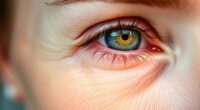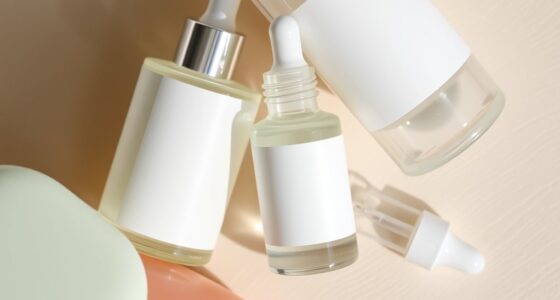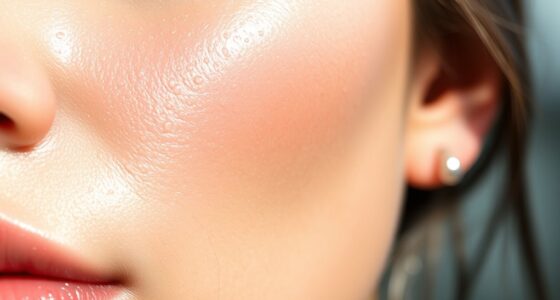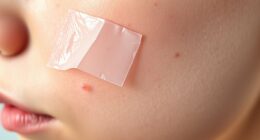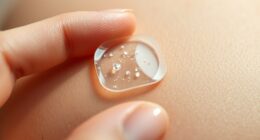Sleep is vital for your skin’s health, affecting hydration, repair, collagen production, and tone. When you skip out on sleep, your skin’s barrier weakens, leading to dryness and dullness. Quality sleep boosts collagen, keeping your skin firm and youthful, while reducing inflammation that can trigger acne and other conditions. Plus, restful nights give your complexion that radiant glow. Want to know more about how your nighttime habits can transform your skin? Keep exploring!
Key Takeaways
- Quality sleep enhances skin hydration by preventing transepidermal water loss, resulting in a softer, more radiant complexion.
- Deep sleep promotes collagen synthesis, crucial for maintaining skin elasticity and reducing signs of aging.
- Adequate rest helps manage inflammation, reducing the risk of acne and other skin conditions linked to cortisol spikes.
- Sleep improves blood circulation, leading to a brighter, more even skin tone and reducing dark circles and puffiness.
- Prioritizing sleep supports cellular repair, ensuring skin maintains its smoothness and youthful glow over time.

When you skimp on sleep, your skin pays the price in ways you mightn’t even realize. A lack of restful sleep can seriously impair your skin barrier function, leading to increased transepidermal water loss. This means your skin becomes less hydrated, making it feel dry and look dull. You might notice that your complexion lacks the softness and elasticity you once enjoyed. Without proper sleep, your skin struggles to maintain its natural moisture balance, causing it to appear rigid and lackluster.
Sleep is crucial for cellular repair and regeneration, especially for your skin. During deep sleep, your body releases growth hormone, which aids in collagen synthesis and tissue repair. If you’re not getting enough quality sleep, this vital repair process is disrupted, leading to premature aging. You’ll find that your skin’s smoothness and youthful glow diminish without adequate rest. So, if you want to keep your complexion radiant, prioritizing sleep is essential. Additionally, gentle methods can help establish a calming bedtime routine to improve sleep quality. Studies show that adequate sleep significantly contributes to overall skin health, and mammography guidelines emphasize the importance of early detection for conditions that might affect your skin.
Prioritize sleep to support skin repair and maintain your youthful glow.
Speaking of collagen, it’s vital for skin elasticity and firmness. Quality sleep boosts collagen production, while poor sleep can lead to a noticeable increase in fine lines and wrinkles. Elevated cortisol levels from sleep deprivation negatively impact collagen integrity, making your skin less firm and elastic. By ensuring you get enough sleep, you support your skin’s natural ability to produce collagen, helping you maintain a youthful appearance. Furthermore, sleep deprivation is linked to increased dead skin cells and diminished skin translucency, compounding the effects of aging.
In addition to hydration and collagen production, sleep helps manage inflammation. A good night’s rest can reduce inflammation, alleviating common skin conditions like acne, eczema, and psoriasis. When you’re sleep-deprived, cortisol levels rise, leading to increased oiliness and inflammation. This can exacerbate existing skin issues and create a cycle of chronic inflammation that worsens your complexion over time. By getting enough sleep, you can keep inflammation at bay and enjoy healthier skin.
You may have noticed how sleep affects your skin tone. Lack of rest can lead to a dull, sallow complexion, making your skin appear tired and uneven. Dark circles and puffiness are also common signs of sleep deprivation. However, when you prioritize sleep, improved blood flow during the night enhances your skin’s radiance, leaving you looking bright and vibrant.
Ultimately, your under-eye area suffers the most without sufficient sleep. You’ll see dark circles and puffiness due to dilated blood vessels and fluid accumulation. Adequate rest not only reduces these issues but also helps your sensitive under-eye skin recover from the day’s stresses. So, for healthier, more radiant skin, make sleep a priority.
Frequently Asked Questions
How Many Hours of Sleep Are Ideal for Skin Health?
For optimal skin health, you should aim for 7 to 9 hours of quality sleep each night.
This duration helps your skin barrier function properly, reducing water loss and enhancing hydration. Adequate sleep boosts collagen production, improving your skin’s elasticity and firmness.
Plus, when you get enough rest, you’ll notice better skin regeneration and repair, leading to a more satisfied appearance.
Prioritize your sleep to keep your skin looking its best!
Can Napping Improve Skin Appearance?
Yes, napping can definitely improve your skin appearance!
When you nap, your body releases growth hormones that boost collagen production, helping to create smoother skin. Increased blood flow during naps nourishes your skin and removes toxins, giving you a radiant glow.
Plus, naps can reduce stress, minimizing breakouts and skin issues. Regular napping not only aids in cellular repair but also contributes to a healthier, more youthful complexion over time.
Does Sleep Position Affect Facial Skin?
Yes, your sleep position can significantly affect your facial skin.
When you sleep on your side or stomach, your face presses against the pillow, causing compression and friction that can lead to wrinkles.
Back sleeping is best for minimizing direct contact and reducing sleep lines.
If you prefer side sleeping, consider using a silk pillowcase to decrease friction, helping to maintain your skin’s elasticity and minimize wrinkle formation over time.
Are There Specific Sleep Products for Skin Care?
Yes, there are specific sleep products designed for skincare.
You can use melatonin-based moisturizers to enhance skin rejuvenation overnight. Retinoid creams promote collagen production while you sleep, targeting wrinkles and pigmentation.
Hydrating masks boost moisture levels, keeping your skin supple. Don’t forget exfoliating products to encourage cell turnover.
Lastly, aromatherapy items can help you relax, creating a calming environment that supports your skin’s nighttime repair processes.
How Does Sleep Deprivation Impact Acne?
Sleep deprivation can seriously impact your acne.
When you don’t get enough rest, your cortisol levels rise, leading to increased oil production and inflammation. This imbalance makes your skin more susceptible to breakouts.
Additionally, poor sleep affects your skin’s ability to repair itself, worsening existing acne.
The stress from lack of sleep can create a cycle that not only harms your skin but also affects your overall well-being.
Prioritize sleep for clearer skin!
Conclusion
As you drift into a peaceful slumber, your skin transforms from tired to radiant, battling the day’s stress while you dream. Neglecting rest leaves your complexion dull and lifeless, but embracing a nightly routine can rejuvenate your face, revealing its true glow. While the world outside buzzes with activity, your skin works tirelessly to repair and restore. Prioritize sleep, and watch your beauty flourish overnight, proving that sometimes, the best treatments happen while you’re deep in dreamland.

